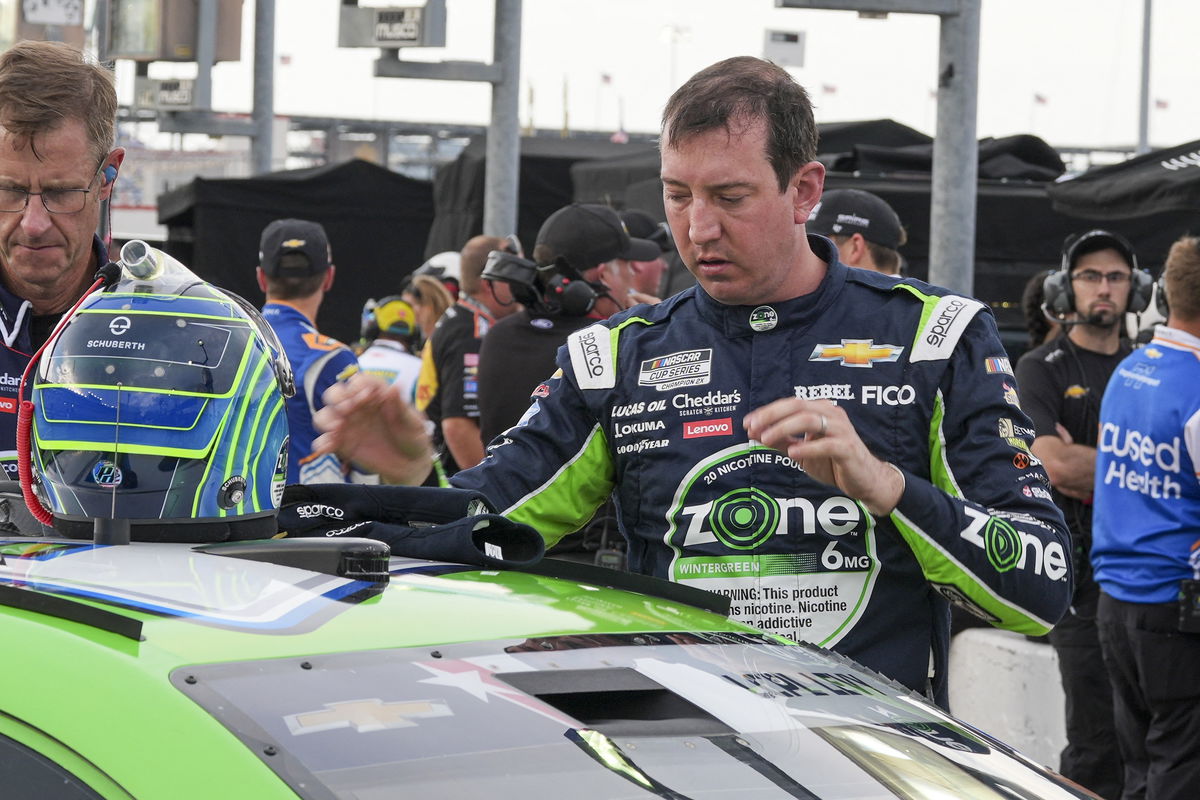
USA Today via Reuters
May 25, 2024; Concord, North Carolina, USA; NASCAR Cup Series driver Kyle Busch (8) removes his helmet during qualifying at Charlotte Motor Speedway. Mandatory Credit: Jim Dedmon-USA TODAY Sports

USA Today via Reuters
May 25, 2024; Concord, North Carolina, USA; NASCAR Cup Series driver Kyle Busch (8) removes his helmet during qualifying at Charlotte Motor Speedway. Mandatory Credit: Jim Dedmon-USA TODAY Sports
Ever since NASCAR unveiled the Next Gen car in 2022, it’s been marketed as a revolutionary step forward. It was marketed as a cost-cutting, parity-building, innovation-driving machine that would level the playing field and electrify the product on track. But three years in, the verdict among drivers remains… complicated. While the car has succeeded in tightening the field and creating more winners, complaints have grown louder. Especially when it comes to short track performance, lack of passing, and a sense that driver skill has taken a backseat to engineering uniformity.
Watch What’s Trending Now!
Some drivers have chosen their words carefully when critiquing the platform. Others? Not so much. And when a Cup Series veteran like Kyle Busch with over 200 career wins across NASCAR’s top three series speaks his mind, people tend to listen. Most importantly, when the frustration is anything but subtle.
Kyle Busch reminisces about the old days
NASCAR is under pressure to improve short-track racing with the Next Gen car. After a series of underwhelming events, executives are now considering a horsepower increase for short tracks as early as this season or in 2026. The plan is to boost engines from the current 670 horsepower to about 750, aiming to make the cars harder to drive and increase the role of driver skill.
NASCAR’s Mike Forde confirmed that the topic was discussed with team owners and drivers, and that engine builders are already working on possible changes. The hope is to create more passing and excitement at tracks like Martinsville and Richmond, where the Next Gen car has struggled to deliver compelling racing. “It was something we proactively brought up to have a further discussion of improving the short-track package,” Mike Forde said via Hauler Talk.
But skepticism remains in the garage. Kyle Busch, never one to hold back, is unconvinced by NASCAR’s “band-aid” approach. When asked about the proposed fixes, Busch replied, “I’ll believe it when I see it. Everything that we’ve done with this car, from the old car, is bigger tires, bigger brakes, less horsepower… I don’t know what the downforce level is, but it’s just not conducive to better racing, in my opinion. I feel like a lot of times the Xfinity Series is better, and that’s the old car we had.”
Rowdy’s bold claims are also supported by data. Just take a look at the recent Bristol races. In the Xfinity Series race, there were eight lead changes among five drivers. Compare that to the Cup Series race at the same place. Kyle Larson led 411 of 500 laps and swept both stages en route to the win. See the contrast?

Imago
LAS VEGAS, NV – OCTOBER 19: Kyle Busch 8 Richard Childress Racing FICO Chevrolet answers questions from members of the media during a media bullpen before practice and qualifying for the South Point 400 NASCAR, Motorsport, USA Cup Series playoff race on October 19, 2024, at Las Vegas Motor Speedway in Las Vegas, NV. Photo by Marc Sanchez/LVMS/Icon Sportswire AUTO: OCT 19 NASCAR Cup Series South Point 400 EDITORIAL USE ONLY Icon144241019026
Kyle Busch’s solution is direct. Bring back the power. But not the 750, raw 900+, as it was, before the restrictor plate and tapered spacers put a limit on it. “The years when we were running 900 horsepower was pretty bada–. The cars were screaming during qualifying,” he stated. In the Gen-6 era, Cup cars regularly pushed 850–900 horsepower, especially before the 2015 reduction. Qualifying laps were blisteringly fast, and drivers had to manage throttle and tire wear with precision. Kyle Busch’s call isn’t just nostalgia. Many drivers and crew chiefs agree that more power would separate the best from the rest. Plus, it will force drivers to work harder behind the wheel.
Echoing the Richard Childress Racing driver’s sentiments, fellow Chevrolet driver Michael McDowell had a blunt verdict on the proposed horsepower increase. When asked if an increase from 690 to 750 would help the short track product, he told Frontstretch, “No, I don’t think it will help the product. It’s just an illusion that some of the drivers and media are trying to paint. I don’t think it’ll make a lick of difference.”
As NASCAR experiments with tweaks, Busch’s skepticism highlights a bigger question. Are these minor fixes enough, or does the sport need a true return to its roots? Well, along with Busch and McDowell, many other Cup drivers have spoken about the horsepower debate.
NASCAR voices rally for raw horsepower
It’s not just Kyle Busch sounding the alarm about horsepower in NASCAR’s top series. Denny Hamlin has become one of the most vocal advocates for returning to higher-powered cars. He also points out that increasing horsepower wouldn’t necessarily escalate costs. He notes that engine bills have remained consistent even as horsepower has decreased from 900 to 650. “The only thing I can do is tell you that when we had 900 horsepower, then 750, and now 650, the engine bills are the same,” Hamlin said.
Similarly, Ty Gibbs echoed the frustrations after the Watkins Glen race in 2024. “Until you put 900 horsepower in these things, you’re not going to do anything. You cannot pass. Sometimes I feel like: is this car designed for us not to pass?” Gibbs said last year. Kevin Harvick went a step further and said, “I still think it’s got to have more than 1,000 horsepower.” However, engine builders like Doug Yates believe that going back to 900 horsepower isn’t as easy as it seems.
Yates explains that such a step will likely require a complete overhaul of the current engine program. “To go back to those 900 horsepower engines, that would be quite the project and would definitely decrease the life of the engine,” Yates explained. Having to pay for a new 900 HP engine nearly every race would eat into the pockets of engine builders, according to Yates, despite what Denny Hamlin believes.
Thus, at the heart of the horsepower debate is a tug-of-war between nostalgia and practicality. Drivers want a return to the visceral, high-risk thrill that once defined stock car racing. But behind the scenes, engine builders and decision-makers are balancing performance, safety, and sustainability. As fans grow louder and Cup Series stars continue to speak out, the pressure on NASCAR leadership is mounting. Whether it leads to a full-throttle revival or just another partial fix remains to be seen. But one thing’s clear. The appetite for raw power isn’t going away anytime soon.
What do you think? Should NASCAR increase the horsepower back to 900? Let us know in the comments!








